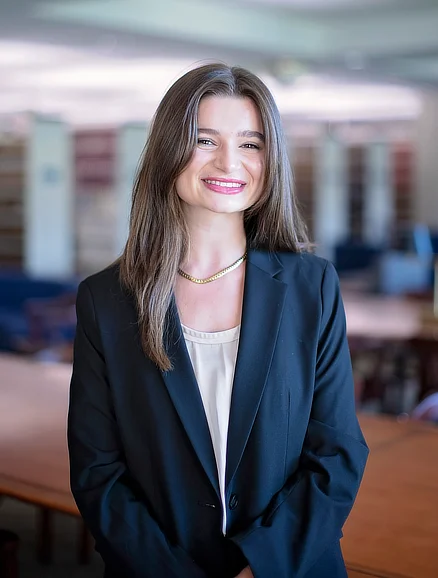
Laura Katherine Cate, a third-year student at Samford University's Cumberland School of Law, is turning her lifelong love of music into a career in entertainment law. This summer she externed with Keller, Turner, Andrews and Ghanem—a Nashville firm representing artists and industry professionals. The experience helped her see how legal knowledge can protect and empower creatives, and Cate hopes to use her law degree to make a lasting impact in the music industry.
What sparked your interest in entertainment law, and how did you connect with the opportunity to extern with Keller, Turner, Andrews and Ghanem?
Ever since I was young, I’ve had a strong passion for music and songwriting. I knew I had to pursue the music industry in some way. As I entered my senior year at Auburn, I talked to my cousin, who’s an attorney, about what I wanted to do in the industry and how I hoped to help artists by protecting their best interests. He mentioned that earning a law degree would allow me to make a bigger difference in advocating for artists.
So, I began pursuing a law degree to support my passion for music, knowing it would lead me to entertainment law. I made every connection I could to learn and expand my knowledge of the industry. Every attorney, artist manager, artist and professional I met shared their advice on how to break into the field. They all said networking and living in Nashville are the best ways to enter entertainment law.
I started emailing every music-related expert in Nashville I could find and even looked at short-term apartment leases. Last fall, I happened to reconnect with an old friend pursuing a music career in Nashville, and he introduced me to his attorney, Rush Hicks at Keller Turner. I reached out to Mr. Hicks by email, and this summer I was mentored by him and his team. I’m so excited to continue working with them this spring.
Can you share a standout project or moment from your summer that deepened your passion for working in the music industry?
This externship allowed me to meet clients and hear their stories and passion for what they do. Witnessing the different instances where others try to infringe on artists’ work or take advantage of trust during the creative and business processes further ignited my desire to advocate for artists.
Music relationships can be complex, especially when friends or family collaborate during the creative process or in business. I want to be able to assist teams by creating clear and well-written agreements in the beginning that will help promote unity and help everyone feel protected. Watching how Mr. Hicks genuinely cared for his clients and used his experiences to provide the best service was so inspiring to me and I hope to do the same when I start practicing. Keller Turner goes above and beyond to ensure excellent client service with a relational approach that builds trust.
How did handling real-world copyright and contract issues compare to what you’ve learned at Cumberland?
I was able to use the knowledge I learned in the classroom at Cumberland as a foundation for other knowledge I learned this summer. Knowing the structure of contracts and learning about basic copyright terms in the classroom set me up for success to learn about them in more specific, real-world situations in the music industry. It really helps to know the fundamentals before learning industry-specific topics.
In what ways has Cumberland helped you feel prepared for this externship and for your future career in entertainment law?
Having a solid understanding of the basics helped expand upon that knowledge in practice. Also, knowing the different terms that attorneys use helped me to be able to follow along the while I was learning new information.
What skills or lessons from your experience do you think will be most valuable as you continue to build your career?
Learning to be adaptable is so important for the music industry because it is constantly changing, developing and evolving. Even after I finish my law degree, I will continue to be a student, learning how to better serve my clients and innovate in my area of influence. I want to leave a positive contribution and legacy in this industry.
What advice would you offer to other law students who are exploring specialized fields like entertainment law?
Be creative with the law degree. If there is a specific passion that keeps resurfacing, find a way to incorporate it into a law practice or use the law degree to help make a positive contribution in another field. It is important to love or have an interest in what you do because we will spend each day doing it. Also, find a mentor in a field of interest and keep knocking on doors because one will open with the right opportunity.